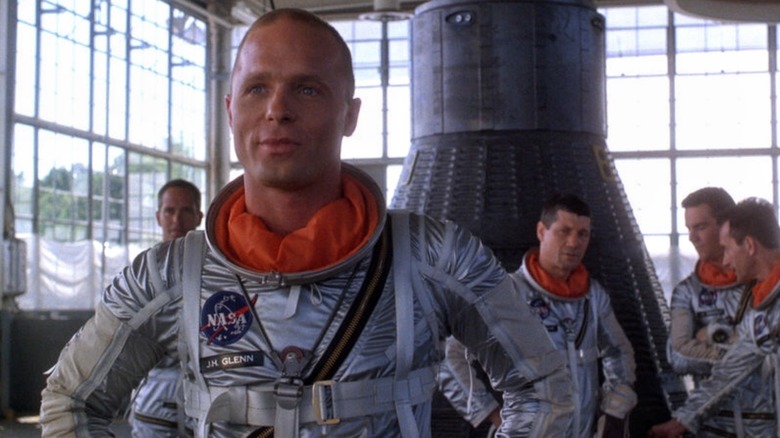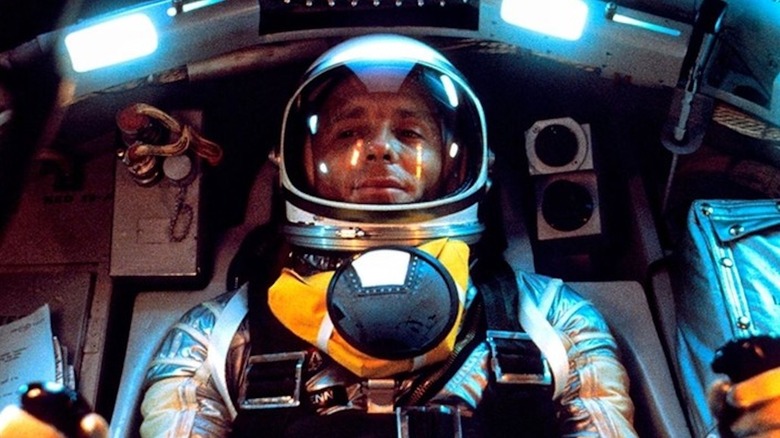How Ed Harris' '80s Historical Drama Pretty Much Destroyed This Company
It couldn't have been easy to grow up as the only son of "Shane," but Alan Ladd Jr. somehow made it work. Ladd père became a movie legend as the gunfighter protagonist of George Stevens' 1953 Western classic, but his oldest son, who would come to be known quite affectionately as Laddie, did not want to follow in the old man's footsteps. He began his showbiz career as an agent for Creative Management Associates (where he repped Warren Beatty, Robert Redford and Judy Garland) before moving into film production in the United Kingdom (where he helped Gary Sherman make the gruesome horror classic "Raw Meat").
Laddie's sharp creative/commercial sensibilities caught the eye of 20th Century Fox, which brought him on as its Vice President of Creative Affairs in 1973. This might've been the most consequential hire in the studio's history, as Laddie championed such pop cultural touchstones as "The Rocky Horror Picture Show," "Young Frankenstein" and "Phantom of the Paradise." When the talent-friendly executive greenlit George Lucas' "Star Wars" (which his C-suite colleagues did not understand, and actually tried to kibosh while it was shooting), he solidified his reputation as one of the few suits who not only genuinely liked movies, but was willing to throw his weight behind directors with big, risky visions.
After shepherding Ridley Scott's "Alien" to the screen in 1979, Laddie departed Fox and launched The Ladd Company. Within the first two years of its existence, the Warner Bros.-financed venture produced a Best Picture winner in Hugh Hudson's "Chariots of Fire," which wound up being a surprise box office hit. The Ladd Company also scored a sleeper success with Lawrence Kasdan's neo-noir "Body Heat" that same year. Alas, just when it seemed like Laddie had established himself as an astute advocate of risk-taking artists with exploitable commercial sensibilities, he got wiped out by two box office bombs that now, over 40 years after their theatrical release, are both considered to be masterpieces. And one of these films featured Ed Harris playing a future U.S. Senator from the once-great state of Ohio.
The Right Stuff was the wrong masterpiece at the wrong time for the Ladd Company
Having greenlit "Alien" at Fox before he left the studio, Laddie knew Ridley Scott was a world-building genius who, when armed with a great screenplay, could deliver a stunningly original blockbuster. "Blade Runner" was original. And brilliant. And one of the most influential films ever made. Unfortunately, Warner Bros. couldn't figure out how to sell it during the wildly competitive summer of 1982, which led to the $30 million production bombing out with a worldwide gross of $42 million.
The not-godawful news for the Ladd Company was that they'd split the financial burden of "Blade Runner" with Sir Run Run Shaw and Bud Yorkin's Tandem Productions. They all lost money, but no one took a bath. The same could not be said a year later, when The Ladd Company poured $27 million into the making of Philip Kaufman's "The Right Stuff." An adaptation of Tom Wolfe's masterful "new journalism" account of the United States' Project Mercury, which launched the country's space program, the film captures the "because it's there" ethos of American exploration — only here there are no moral hang-ups because going to space (in vague anticipation of reaching the moon) didn't require the massacre of millions of indigenous people.
Kaufman's film is a seamless blend of disparate film formats, inventive optical FX, and immersive sound design. It remains one of the most transporting movies ever made. Oh yeah, and it's got a killer ensemble cast that includes Ed Harris, Scott Glenn, Dennis Quaid, Fred Ward, Sam Shepard, Barbara Hershey, Jeff Goldblum and, seriously, I'm just scratching the surface. The problem for the Ladd Company was that none of these people were movie stars in 1983, and moviegoers balked at the 192-minute runtime (even though it's easily the most entertaining three-hour film ever made).
"The Right Stuff" failed to launch with a $21 million domestic gross, which proved to be the nail in the coffin for the Ladd Company. It was such a costly failure that even the surprise $150 million worldwide haul of 1984's "Police Academy" (against a $5 million budget) couldn't convince WB to stick with Laddie's venture.
This wasn't the end for Alan Ladd Jr. as a producer, though — far from it. He reconstituted the Ladd Company on a much smaller scale at Paramount in 1995, and knocked out a hit with "The Brady Bunch Movie" and a blockbuster Best Picture-winner with Mel Gibson's "Braveheart." This was sweet vindication for Laddie, but it was also bittersweet, because every filmmaker who ever worked with the Hollywood legend, from Lucas to Kaufman to Gibson, would tell you he was a straight shooter who believed in his directors and concentrated his efforts on protecting him from executive interference. He was a rare breed, and the movies would look a lot different today if he'd never worked in this industry.

